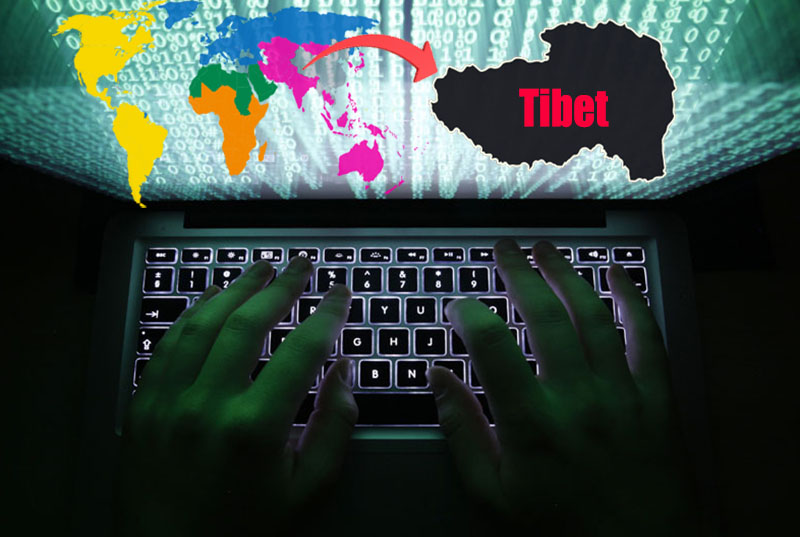 Dharamshala — The international watchdog Freedom House published a report called Freedom On the Net 2017: Manipulating Social Media to Undermine Democracy, in which China was once again found to be the worst abuser of internet freedom, and Tibet was among China’s top censored search keywords.
Dharamshala — The international watchdog Freedom House published a report called Freedom On the Net 2017: Manipulating Social Media to Undermine Democracy, in which China was once again found to be the worst abuser of internet freedom, and Tibet was among China’s top censored search keywords.
According to the report: "China was the world’s worst abuser of internet freedom in Freedom on the Net for the third consecutive year, followed by Syria and Ethiopia. New regulations increased pressure on companies to verify users’ identities and restrict banned content and services. Meanwhile, users themselves were punished for sharing sensitive news and commentary, with prison terms ranging from five days to eleven years."
In terms of internet freedom on a global scale, the report noted a general decline, saying, "Online content manipulation contributed to a seventh consecutive year of overall decline in internet freedom, along with a rise in disruptions to mobile internet service and increases in physical and technical attacks on human rights defenders and independent media."
In regards to China specifically, Freedom House noted, "The government tightened online controls in advance of the 19th National Congress of the Chinese Communist Party (CCP) in October 2017, at which President Xi Jinping, the party’s general secretary, cemented his leadership for the next five years. 'Cyberspace sovereignty' has been a top policy goal under Xi, and related legal changes were incorporated into a cyber security law adopted in November 2016.
"The Chinese government maintains a sophisticated censorship apparatus, including both automated mechanisms and human monitors, to block online criticism of individuals, policies, or events considered integral to the one-party system."
The report went on to note that Tibet was one of the targeted topics for censoring, as Tibet, along with Taiwan and Tiananmen Square, were systematically blocked by the Chinese authorities. The report said, "The most censored breaking news topics were related to the reputation of the party or officials, health and safety, foreign affairs, official wrongdoing, media censorship, or civil society activism. There was also consistent and systematic censorship of content addressing long-standing taboos such as the Cultural Revolution, the 1989 crackdown on Tiananmen Square protesters, Taiwanese independence, repression of minorities in Xinjiang and Tibet, and the banned spiritual group Falun Gong.
"Spear-phishing, in which customized email messages are used to trick recipients into downloading malicious software by clicking on a link or a seemingly legitimate attachment, is another common tactic. Tibetans, Uyghurs, and others have been targeted with emailed programs that install spyware on the user’s device," the report added.
China's attempted control over Tibetans' social media use did not stop there, as according to local reports from inside Tibet, in September 2017, China’s Public Security Bureau of Machu (Ch: Maqu), Kanlho Tibetan area in Gansu Province issued a public notice entailing a list of instructions to online chat group administrators. The notice warned all chat group administrators and owners of public online accounts to regulate and take responsibility for the contents shared in the group. The regulations were said to promote “healthy and orderly development of online community” and “uphold socialist core values”.
In 2017, a number of Tibetans faced arrest and detention for sharing information over the internet, including Gedhun, a young Tibetan from Sershul county in Karze, Eastern Tibet, who in March was beaten severely and arrested for sharing online an image of His Holiness the Dalai Lama and the banned Tibetan national flag.
In February 2016, a prominent Tibetan blogger, Druklo, popularly known by his pen name Shokjang, was given a three-year sentence after he was accused of 'inciting separatism' and 'causing instability' for writing about the heavy military presence and crackdown on Tibetans in his town, Rebkong. He had shared the images on WeChat, a popular Chinese messaging app widely used by Tibetans inside and outside Tibet.


![Tibet has a rich history as a sovereign nation until the 1950s when it was invaded by China. [Photo: File]](/images/stories/Pics-2024/March/Tibet-Nation-1940s.jpg#joomlaImage://local-images/stories/Pics-2024/March/Tibet-Nation-1940s.jpg?width=1489&height=878)















